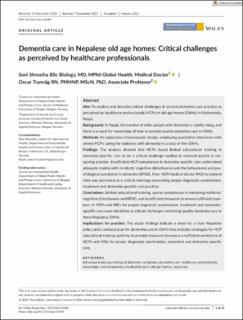Dementia care in Nepalese old age homes: Critical challenges as perceived by healthcare professionals
Journal article, Peer reviewed
Published version

Åpne
Permanent lenke
https://hdl.handle.net/11250/2997615Utgivelsesdato
2022Metadata
Vis full innførselSamlinger
Sammendrag
Aim
To explore and describe critical challenges in current dementia care practice as perceived by healthcare professionals (HCPs) in old age homes (OAHs) in Kathmandu, Nepal.
Background
In Nepal, the number of older people with dementia is rapidly rising, and there is a need for knowledge of how to provide quality dementia care in OAHs.
Methods
An exploratory hermeneutic design, employing qualitative interviews with eleven HCPs caring for residents with dementia in a total of five OAHs.
Findings
The analysis showed that HCPs found limited educational training in dementia-specific care to be a critical challenge leading to reduced quality in caregiving practice. Insufficient HCP competence in dementia-specific care undermined adequate coping with residents’ cognitive disturbances and the behavioural and psychological symptoms in dementia (BPSD). Poor HCP/medical doctor (MD)-to-patient ratio was perceived as a critical challenge preventing proper diagnostic examination, treatment and dementia-specific care practice.
Conclusions
Limited educational training, sparse competence in mastering residents’ cognitive disturbances and BPSD, and insufficient resources to ensure sufficient numbers of HCPs and MDs for proper diagnostic examination, treatment and dementia-specific care were identified as critical challenges restricting quality dementia care in these Nepalese OAHs.
